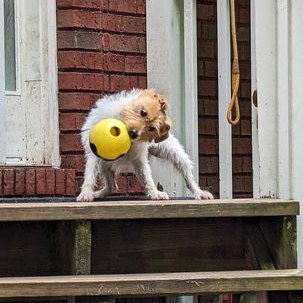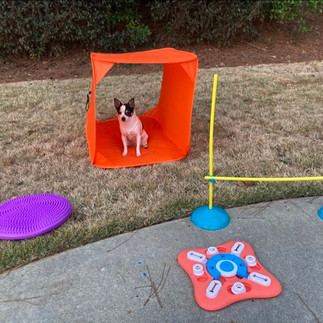Fun and Fulfilling Activities for Reactive Dogs: Exercise, Enrichment, and More
- Chelsea Murray CPDT-KA, KPA-CTP, CTDI

- Sep 10, 2025
- 6 min read
Living with a reactive dog can feel overwhelming at times. Whether your dog barks, growls, or lunges at other dogs or people, daily walks around the neighborhood may leave both of you stressed instead of fulfilled. The good news? Walks aren’t the only way to give your pup the exercise, enrichment, and fun they need.
In fact, there are plenty of activities for reactive dogs that can build your relationship, reduce stress, and even open the door to exciting dog sports and training opportunities.
Why Traditional Walks Can Be Stressful
For reactive dogs, the constant unpredictability of neighborhood walks—passing dogs, people, or noisy environments—can trigger big reactions. Each outburst releases adrenaline and cortisol, stress hormones that can linger in the body for days. Over time, this “stress stacking” can make reactivity worse.
That’s why giving your dog enrichment and exercise alternatives in calmer, controlled settings is often healthier than powering through stressful walks. By finding activities that set your dog up for success, you’ll not only meet their needs but also strengthen your bond.
Exercise Alternatives for Reactive Dogs
Decompression Walks – Instead of a busy neighborhood stroll, try quiet trails, wooded paths, or open fields where your dog can relax. Using a long line gives them freedom to sniff and explore while still keeping them safe. These walks allow your dog to truly unwind, lower stress levels, and just “be a dog.”
Private Rentals – Platforms like Sniffspot make it easy to rent fenced yards or fields by the hour. This gives your reactive dog a safe, controlled environment to run, sniff, and play without unexpected encounters. It’s freedom without the fear of running into triggers.
Flirt Pole Play – A flirt pole (think of it as a giant cat toy for dogs) lets your dog chase, pounce, and burn energy in a small space. It’s fantastic for physical exercise, but it also builds impulse control when you ask for sits, downs, or releases between turns. See tutorial video here.
Swimming or Hydrotherapy – Many dogs love the water, and swimming is a safe, low-impact way to build strength and stamina. Hydrotherapy facilities may also be available for dogs with joint issues. Private pool rentals make swimming a trigger-free option for reactive dogs.
Enrichment for the Mind and Body
Mental stimulation can be just as rewarding as physical activity. By giving your dog enrichment activities at home, you help satisfy their natural instincts and reduce frustration.
Puzzle Feeders & Frozen Kongs – Replace your dog’s food bowl with puzzles or freeze a Kong stuffed with kibble, yogurt, or peanut butter. This keeps your dog busy, encourages problem-solving, and slows down mealtime.
DIY Enrichment – Household items like cardboard boxes, muffin tins, or paper towel rolls can be turned into safe puzzles. Let your dog shred, dig, or forage for treats in creative ways that tap into their natural drives.
Snuffle Mats & Treasure Hunts – Encourage your dog’s sense of smell by scattering food in a snuffle mat, tall grass, or even around your living room. These treasure hunts build confidence and provide a calming activity.
Digging Opportunities – Digging is a natural behavior for many dogs, and providing a safe outlet can prevent unwanted yard damage. Creating a designated dig spot—like a sandbox or a section of the yard filled with sand or soil—lets your dog enjoy searching, burying, and uncovering toys or treats. By giving them a “yes” space for digging, you satisfy their instinct while reducing nuisance digging in flower beds or lawns.
Building Your Relationship Through Training and Play
Reactive dogs benefit enormously from training that focuses on teamwork, trust, and fun. Even short sessions can deepen your bond and improve your dog’s confidence.
Short Training Sessions – Keep sessions under five minutes and focus on one skill at a time, like eye contact or hand targets. These micro-sessions prevent frustration and allow you to celebrate small wins.
Trick Training – Tricks like spin, roll over, or shake may seem silly, but they build confidence and give your dog a way to earn reinforcement in a lighthearted way. You can also work toward AKC Trick Dog titles, many of which can be completed virtually.
Calm Play – Play doesn’t always need to be rough or high-energy. Gentle games of tug (with clear rules), “find it” with tossed treats, or even quiet cuddle sessions all strengthen your bond and help your dog feel secure.
Sports and Structured Fun for Reactive Dogs
Dog sports aren’t just for social butterflies! Many activities are surprisingly reactive-dog friendly and can even be pursued virtually so you and your pup can participate from the comfort of home. These options give you structured goals, a sense of accomplishment, and positive outlets for your dog’s energy.
Rally Obedience – This sport is like a course of obedience exercises that you and your dog complete together. Rally builds daily life skills and teamwork, and AKC now offers virtual rally titles, making it accessible to reactive dogs who aren’t ready for group classes. Learn more about Rally.
Canine Fitness – Programs like Do More With Your Dog offer virtual canine conditioning titles. These exercises improve your dog’s strength, balance, and body awareness while giving you both structured goals to work toward at home.
Trick Training – Beyond being fun, trick training can become a sport through programs like AKC Trick Dog titles. Since many are offered virtually, it’s a reactive-friendly way to keep training exciting and measurable. See our YouTube playlist all about trick training.
Cooperative Care Certificate (CCC) – Cooperative care training is crucial for all dogs, but especially for reactive dogs who may struggle at the vet or groomer. The CCC program provides levels of training for essential skills like wearing a muzzle, taking medication, and staying comfortable in different positions. This certification gives you a roadmap to make care experiences less stressful for your dog.
AKC Virtual Home Manners – This program helps you and your dog work on the essential day-to-day household manners that make life easier. From polite greetings to crate manners, the Virtual Home Manners title gives you a structured way to tackle everyday challenges in a positive way. Learn more about the VHM program here.
Nosework/Scentwork – One of the best sports for reactive dogs, nosework allows your dog to do what they love most: sniff. Many scent work trials are designed to be reactive-dog friendly, and for those not ready for competition, there are also virtual scentwork titles available. Read our blog all about nosework to learn more.
Dock Diving – If your dog loves water, dock diving is thrilling! Many facilities offer private lessons or even private pool rentals, giving you a safe and trigger-free way to enjoy the sport.
Agility – Agility is a fantastic way to exercise both your dog’s mind and body. While group classes and trials might be overwhelming, private lessons offer a low-stress way to enjoy the sport. For added structure, AKC and The Valor Project both offer virtual agility titles, allowing you to play with a purpose at your own pace.
Dog Parkour – Parkour combines agility-like skills with everyday obstacles in your environment. It’s excellent for confidence building and body awareness. The International Dog Parkour Association even offers virtual titles, which makes it easy to participate on your own.
Barn Hunt – Barn hunt taps into your dog’s natural prey drive and provides an outlet for hunting instincts. While traditional trials aren’t reactive-friendly due to their busy environments, many training facilities offer private barn hunt lessons. If your dog is comfortable with people, this can be a fun sport to explore together.
Weight Pulling & Fitness Sports – These activities harness your dog’s natural strength in a structured and safe way. They build confidence and provide a satisfying physical outlet.
Canine Freestyle (Dog Dancing) – This creative sport combines obedience, tricks, and music. It emphasizes teamwork and can be practiced at home, making it a wonderful bonding activity.
Creating Balance for Your Dog
The best plan for a reactive dog combines physical exercise, mental enrichment, and calm recovery time. After stimulating activities, make space for decompression. Offer a quiet chew, gentle grooming, or simply relax together on the couch.
Every reactive dog is unique. Some will thrive on nosework or rally, while others may prefer enrichment games at home or the joy of dock diving. The most important thing is finding activities that bring your dog happiness without adding stress.
Ready to Try Something New With Your Reactive Dog?
If you’re feeling stuck, you don’t have to navigate this journey alone. At Pawsitive Futures, we specialize in helping reactive dogs and their families thrive.
We offer:
Private lessons (virtual and in-person) for personalized support.
Sport foundation group classes around Metro Atlanta to build skills in a supportive environment.
Practical tools to help you and your dog live more confidently together.
✨ Don’t wait—your dog deserves enrichment, exercise, and joy without the stress. Contact us today to get started.
































































Comments